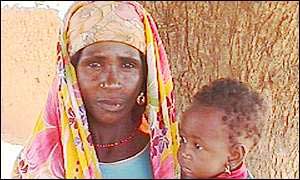| You are in: World: Africa | |||||||||||||||||||||
|
|
Monday, 14 January, 2002, 13:59 GMT
Nigeria stoning appeal delayed

The case has provoked international reaction
An Islamic court in northern Nigeria has postponed an appeal hearing on behalf of a woman sentenced to death by stoning for the crime of adultery.
But she now says that the baby at the centre of the case was fathered by her former husband. This would not be an offence under Sharia law and she would be acquitted. The postponement is to give prosecution lawyers enough time to react to the new evidence. The hearing will now take place on 18 March. Animated crowd Ms Husaini's lawyer, Abdulkadir Imam, said that her earlier statement had been made under duress, without legal representation. "At that time, she did not understand the nature and consequence of the offence she was charged with nor the questions she was asked," he said.
Correspondents say that Ms Husaini sat breast-feeding her daughter during the hearing. The courtroom was packed and there was an animated crowd outside. Safiya Husaini was convicted by a Sharia or Islamic court in Sokoto state last year - a crime which carries a mandatory death sentence.
Harsh criminal punishments, such as death by stoning and amputation of limbs for theft, have been introduced in many of Nigeria's majority Muslim northern states over the past two years. But although amputations have been carried out, no one has yet been stoned to death. Young baby Safiya Husaini is not being held in prison. Under Islamic law, she is free to live with her family until she either wins her appeal or is taken away to be stoned to death.
Last month, our correspondent in Nigeria, Dan Isaacs, met Safiya Husaini in her home village of Tungra Tudu near Sokoto, and she was cradling a baby in her arms. The girl's name is Adama, and almost a year old now, she is the product of the allegedly adulterous relationship. Under Sharia law in Sokoto state, it is sufficient for a woman to conceive a child outside wedlock for her to be convicted. Political case
Ms Husaini herself is not married. But as a divorcee, she is still considered to have committed adultery, and not the lesser crime of fornication. That crime applies only to women who have never been married and it carries the more lenient punishment of about 100 lashes. For a man to be convicted of adultery, he must either confess to the judge in an Islamic court or else four men must have witnessed the actual act. If Ms Husaini does lose this appeal, she can take it further, right up to the Supreme Court in the federal capital, Abuja. Our correspondent says that if Ms Husaini's latest appeal does not work, there are three further grounds for appeal:
The case has already become extremely political, and our correspondent says that ultimately it will be the politicians and not the lawyers who will decide Ms Husaini's fate.
|
See also:
Internet links:
The BBC is not responsible for the content of external internet sites Top Africa stories now:
Links to more Africa stories are at the foot of the page.
|
|||||||||||||||||||
|
Links to more Africa stories
|
|
|
^^ Back to top News Front Page | World | UK | UK Politics | Business | Sci/Tech | Health | Education | Entertainment | Talking Point | In Depth | AudioVideo ---------------------------------------------------------------------------------- To BBC Sport>> | To BBC Weather>> ---------------------------------------------------------------------------------- © MMIII | News Sources | Privacy |
|